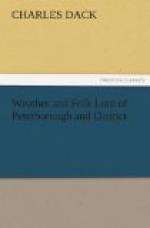St. Catherine’s day, Nov. 25Th.
The female children belonging to the Workhouse were dressed in white, trimmed with coloured ribbons, and went in a procession headed by the Workhouse Master and the tallest girl who wore a crown of gilt paper and carried a sceptre and distaff. They stopped at the houses of the principal inhabitants and sang this song. Money was given them and they had rump steak and onions for dinner, and a tea party, and games in the evening:
Here comes Queen Katrin as fine as any Queen,
With a coach and six horses a coming to be seen,
And a spinning we will go, will go, will go,
And a spinning we will go.
Some say she is alive, and some say
she is dead,
And now she does appear with a crown upon her head,
And a spinning we will go, etc.
Old Madam Marshall she takes up her
pen
And then she sits and calls for all her royal men.
And a spinning we will go, etc.
All that want employment though spinning
is but small,
Come list and don’t stand still, but go and
work for all.
And a spinning we will go, etc.
If we set a spinning we will either
work or play,
But if we set a spinning we can earn a crown a day.
And a spinning we will go, etc.
And if there be some young men, as
I suppose there’s some,
We’ll hardly let them stand alone upon the
cold, cold, stone.
And a spinning we will go.
Spinning was the employment for the females in the old Work house, and in the Dean and Chapter’s accounts of payments there are entries of payments on St. Catherine’s Day for wheels and reels for the children of the Workhouse.
December.
St. Andrew’s day.
December 11th, commonly called “Tander,” used to be kept by the Lace-makers as a feast day. St. Andrew was their Patron Saint. On that day men and women used to go about dressed in each other’s clothes, and calling at various houses and drinking hot elder wine. On this day the Morris Dancers or Mummers began their visits. There were from four to eight people who took part in the Mummery. The King, Beelzebub, Doctor, Doctor’s man and Jack, the fool. Sometimes one took the part of the Doctor’s horse and the Doctor made his entry riding on the horse, who was on his hands and knees but he generally had a small stool in his hands to make him a little higher, when moving about. This is described in Old Customs.
On St. Andrew’s Day it was a custom called “Tander” at Easton on the Hill, about 12 miles from Peterborough, and other places, of the boys locking the village Schoolmaster out of School and demanding the rest of the day as a holiday, before the door was reopened. If the Schoolmaster could obtain an entrance to the School before giving his consent, the holiday was not given.




